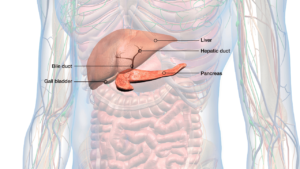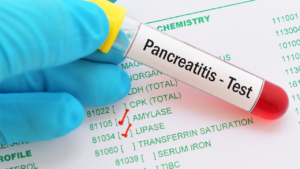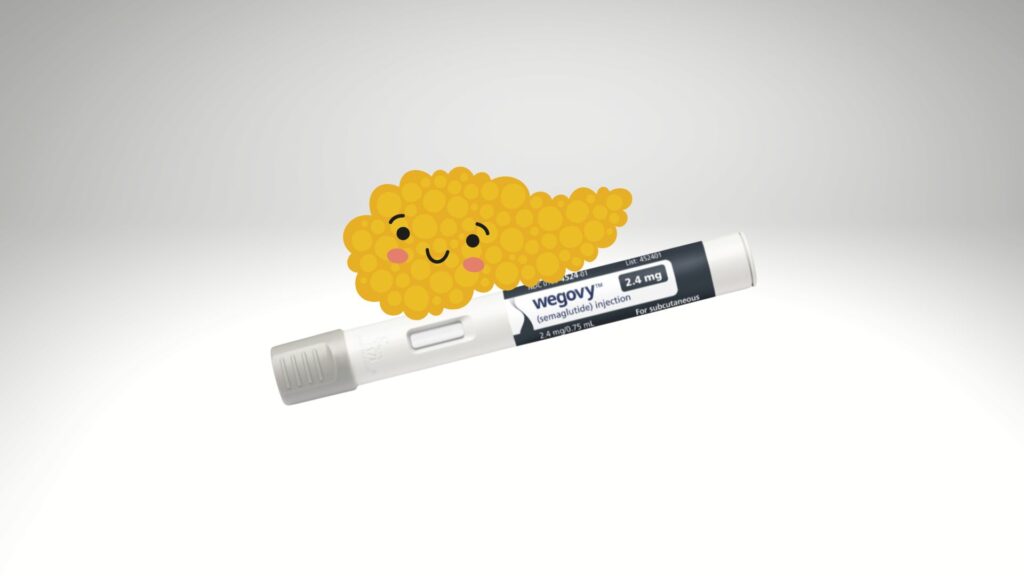GLP-1 medications may get wrongly associated with causing pancreatitis when in fact, the pancreatitis was due to another circumstance!
Like how my mother would wrongly blame me for tracking mud into the house when I have a younger and much less respectful younger brother that could easily frame me by wearing my boots and tracking said mud through the house…but, I digress.
Let’s get into it!
The Cool Organ, the Pancreas
 The pancreas and Wegovy. Some of you might know the good, but most of you probably have only heard of or focused on the bad – in particular, how medications like Wegovy and Saxenda may cause pancreatitis or even pancreatic cancer. Is this true? How does it happen? So let’s talk about what Wegovy, Saxenda and the other GLP-1 medications are actually doing to the pancreas.
The pancreas and Wegovy. Some of you might know the good, but most of you probably have only heard of or focused on the bad – in particular, how medications like Wegovy and Saxenda may cause pancreatitis or even pancreatic cancer. Is this true? How does it happen? So let’s talk about what Wegovy, Saxenda and the other GLP-1 medications are actually doing to the pancreas.
To start, the pancreas is a cool little organ that sits behind the stomach and does a multitude of things related to digestion and managing blood sugars. In particular, it releases two hormones – insulin and glucagon. Insulin helps to bring our blood sugar levels down, and glucagon helps to bring our blood sugar levels up.
GLP-1 Stimulates the Pancreas
As you might have heard me mention before, GLP-1 is a hormone that is naturally produced by our body. Medications like Wegovy and Saxenda basically mimic our natural GLP-1 hormone, therefore, exerting similar effects to our natural GLP-1 hormone!
So GLP-1 does a couple of things at the pancreas. The first thing it does is it stimulates the pancreas to produce more insulin to bring our blood sugar levels down. I kind of like to think of it as GLP-1 giving the pancreas a nice little massage to help it work more efficiently. Further, like any good massage, GLP-1 also makes the pancreas healthier by helping it to produce more cells and maintain the cells it has, which again helps with insulin production. While all of this is going on, GLP-1 is also reducing the amount of glucagon that the pancreas produces. Therefore, the overall effect is that when blood sugar levels are elevated after a meal or in the case of diabetes, GLP-1 will help to bring those sugar levels down to a normal range!
Linking GLP-1 Medications
That is the good stuff. Now, what about the bad? In terms of pancreatitis and pancreatic cancer, this is where things get a little trickier. That is because it has been difficult to link any of the GLP-1 medications directly to causing pancreatitis or pancreatic cancer. In fact, only ~2% of cases of pancreatitis are thought to be caused by a particular drug – this includes all potential drugs, not just the GLP-1 medications. Before I get too far ahead of myself, pancreatitis is an inflammation of the pancreas and pancreatic cancer, well I hope is pretty self-explanatory.
Underlining Causes
In a majority of the cases where pancreatitis has been reported in patients taking GLP-1 medications, there is usually another underlying cause. For example, rapid weight loss and sometimes not so rapid can lead to the production of gallstones.
 Gallstones can be like living next to a frat house. They might be having a great time partying it up, but if you live next door and are a responsible adult that has learned to value sleep, you might get a little pissed off. Same thing goes for your responsible pancreas. GLP-1 medications can lead to weight loss which then leads to rambunctious gallstones, which then pisses off your pancreas, and voila, you get pancreatitis. So you can see how the GLP-1 medication did not directly cause pancreatitis. Similarly, if you have diabetes and elevated blood sugars, which many people who take GLP-1 medications do have, you are at a higher risk of developing pancreatitis than the general population.
Gallstones can be like living next to a frat house. They might be having a great time partying it up, but if you live next door and are a responsible adult that has learned to value sleep, you might get a little pissed off. Same thing goes for your responsible pancreas. GLP-1 medications can lead to weight loss which then leads to rambunctious gallstones, which then pisses off your pancreas, and voila, you get pancreatitis. So you can see how the GLP-1 medication did not directly cause pancreatitis. Similarly, if you have diabetes and elevated blood sugars, which many people who take GLP-1 medications do have, you are at a higher risk of developing pancreatitis than the general population.
Are GLP-1 Medications to Blame?
Hopefully, you can see how the GLP-1 medications may get wrongly associated with causing pancreatitis when in fact, the pancreatitis was due to another circumstance! Like how my mother would wrongly blame me for tracking mud into the house when I have a younger and much less respectful younger brother that could easily frame me by wearing my boots and tracking said mud through the house.
Can’t be Ruled Out
 I digress now in saying all the above, we have not definitively been able to rule out the GLP-1 medications as a direct cause of pancreatitis in some cases, albeit it is rare. Now we don’t know what exactly is happening in these situations, but I like to think about it as the GLP-1 masseuse might be a tad aggressive with their massage. Don’t get me wrong, when I go for my deep tissue massages, I expect some amount of pain and then relief, but there may be some days when either I am a bit more sensitive, or my therapist is having a fight with his wife. Needless to say, it might be a bit more painful than usual. Thus something similar might happen with GLP-1 and our pancreas – which may lead to the development of pancreatitis. Again, we don’t know all the details as of yet, and everyone is a little different.
I digress now in saying all the above, we have not definitively been able to rule out the GLP-1 medications as a direct cause of pancreatitis in some cases, albeit it is rare. Now we don’t know what exactly is happening in these situations, but I like to think about it as the GLP-1 masseuse might be a tad aggressive with their massage. Don’t get me wrong, when I go for my deep tissue massages, I expect some amount of pain and then relief, but there may be some days when either I am a bit more sensitive, or my therapist is having a fight with his wife. Needless to say, it might be a bit more painful than usual. Thus something similar might happen with GLP-1 and our pancreas – which may lead to the development of pancreatitis. Again, we don’t know all the details as of yet, and everyone is a little different.
Pancreatic Cancer
With regard to pancreatic cancer, there is even less evidence. In my opinion, there is essentially zero data showing that GLP-1 medications are linked to or associated with causing pancreatic cancer. Pancreatic cancer and the pathophysiology around it are complex, and having one episode of pancreatitis is extremely unlikely to lead to pancreatic cancer. Kind of like smoking 1 cigarette isn’t going to cause lung cancer. However, smoking 20 cigarettes a day for 20 years well then we have a much better chance of causing some issues. 
On the off chance you don’t believe a single word I just said, you can check out these multiple reviews for further details – here, here, here and here. Each one has found from combining the data of multiple studies that the rate of pancreatitis and pancreatic cancer with the GLP-1 medications was similar to the rates in the placebo groups. While some observational studies and FDA reports have noted that there have been cases of pancreatitis and pancreatic cancer reported, these again suffer from issues with confounders, as I explained above, with diabetes and rowdy gallstones.
All in all, the risk of pancreatitis and pancreatic cancer with GLP-1 medications is exceedingly low. We can never say zero as this is science and medicine, so there is always a possibility of new data emerging, but even if new data came out, it would only confirm that this risk is very low.
This was meant to be a slightly shorter article which I may have achieved by 200-300 words shorter, so ‘Yay’ me! I nonetheless hope you found it helpful, and of course, if you have further questions, you can find me on the places via @theOfficialDrDan!
—
If you have any questions feel free to reach out. If you got some benefit out of this article, feel free to share it with a friend.
Otherwise, always remember that small tweaks lead to massive peaks!
Until next time.
 Dr. Dan
Dr. Dan
Follow me on social media for regular updates – @TheOfficialDrDan
Subscribe to my newsletter for a heads-up on all new content.
Sharing is caring! Here’s the link for social, email, and even text – https://healthevolved.co/wegovy-pancreas
If you need some coaching support on your weight management journey, you can book a consultation with me to see if you’d be a good fit for our program.
Questions or comments? Please send them my way on our Contact Us page!


 Dr. Dan
Dr. Dan



